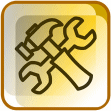Digital Systems Syllabus
ONE OF THE SUBJECTS OF MY ELECTRONIC ENGINEERING DEGREE
1. DIGITAL FUNDAMENTALS:
Number Systems:
- Binary - addition, subtraction, 2's complement, conversions
- Octal - addition, subtraction, conversions
- BCD code - addition, conversions
- Gray code - conversions
- Excess-3 code - conversions
- Alphanumeric codes
- Signed numbers - addition, subtraction
- Odd and even parity
Logic Gates:
- Inverter, AND, OR, NAND, NOR,
- Exclusive OR, exclusive NOR
- Truth tables
- Applications
Boolean Algebra
- Operations, expressions
- Rules and laws
- De Morgan's Theorems
- Boolean expressions for gate networks
- Simplification using Boolean algebra
- Simplification using Karnaugh maps
- Truth tables, wave forms
- Applications
Combinational Logic
- Analysis, design
- Universal property of NAND and NOR gates
- Combinational logic using universal gates
- Truth tables, wave forms
- Applications
2. LOGIC FUNCTIONS
- Adders, parallel binary adders, ripple carry vs. look ahead carry adders, comparators, encoders, decoders, code converters, multiplexers, demultiplexers, parity generators / checkers truth tables, wave forms
Flip Flops And Related Devices
- Latches, edge triggered flip flops, pulse triggered (master-slave) flip flops, data lock-out flip flops, characteristics, applications, one-shots, truth tables, wave forms
Counters
- Asynchronous, synchronous, up/down, design of sequential circuits, cascaded counters, counter decoding, applications truth tables, wave forms
Shift Registers
- Functions, serial in - parallel out, S in - S out, P in - P out, P in - S out, bi directional, shift register counters, applications truth tables, wave forms.
Memories And Programmable Logic Devices
- Concepts, ROMs, PROMs, EPROMs, EEPROMs, RAMs memory expansion, magnetic memories, miscellaneous.
System Interfacing
- Interfacing digital and analog, D-A conversion, A-D conversion truth tables, wave forms
Introduciton To Microprocessor Systems
- CPU, memory, I/O ports, I/O interrupts, direct memory access, the microprocessor, programming, read/write functions
IC Technologies
- Characteristics and parameters
- TTL circuits
- CMOS circuits
- Comparisons
Error Detection And Correction
- Error detection codes, Hamming Code, correcting an error
3. MICROPROCESSOR ARCHITECTURE : 8085
- ALU, flag registers, auxiliary registers, control circuits, connections, functions
System Bus : 8085
- Address bus, data bus, control bus, data / address bus multiplexing, address latch enable
- Control of busses
- Wave forms
I/O Ports And Interfacing
- Addressing I/O ports Memory mapped I/O
- Latching and enabling I/O ports
- Direct memory access Wave forms
Memory
- Memory expansion, memory decoding, and addressing, enable, disable
Functions
- Read, write, arithmetic, logic, machine cycles, wave forms, T states
Programming : 8085
- In depth study of the instructions of the 8085, and what flags they would affect, where the data would go, what they mean, and how to write programs using these instructions, using sub-routines, performing arithmetic and logic calculations, shifting data.
 Posted by Russell Carter
Posted by Russell Carter
![]() 27 April 2008
27 April 2008

